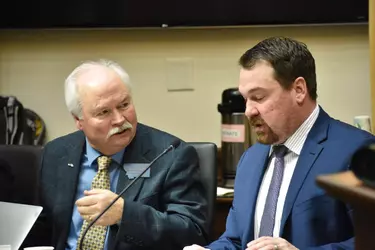
Montana Democratic Minority Leader Sen. Pat Flowers, left, speaks with Republican Sen. Josh Kassmier during a committee meeting at the state Capitol, April 16, 2025, in Helena, Mont. (AP Photo/Matthew Brown)
By MATTHEW BROWN and HANNAH SCHOENBAUM
Updated 5:03 AM UTC, April 30, 2025
HELENA, Mont. (AP) — Following Montana Republicans’ overwhelming dominance in the fall election, a group of GOP lawmakers kicked off the 2025 Legislature with an unexpected move: ceding power to Democrats.
The minority took full advantage, remaking legislative committees and banding with a handful of moderate Republicans to thwart GOP leaders’ efforts to make Montana’s judicial system more partisan. Similar alliances bolstered Medicaid expansion, raised teacher pay and passed a state budget increase that includes investments in health care.
The partnership seems to defy divisions between America’s two major political parties that have played out in Washington, D.C., and in many statehouses. But it may prove fleeting if elections in the Big Sky State continue mirroring national trends that have hardened party lines. Montana’s conservative and moderate Republicans alike express allegiance to President Donald Trump.
Lawmakers meet for just a few months every two years inside Montana’s Capitol, perched on a hill overlooking Helena, a city of about 35,000 people founded during an 1864 gold rush. It remains a true citizen legislature, opening the playing field for compromise, said political analyst Jeremy Johnson.
“Montana’s becoming an outlier on how a state legislature is operating with this sort of dynamic,” said Johnson, an associate professor at Carroll College.
A ‘weird’ session for Republicans
As the 2025 session wraps up, possibly as soon as Wednesday, GOP legislative leaders are frustrated at their failure to remodel the state’s judiciary and rein in spending.Republicans did band together to impose more restrictions on transgender people and pass an income tax cut Democrats decried as a handout to the wealthy. But conservative Republicans frequently found themselves sidelined as their moderate colleagues hammered out deals with Democrats on health care, education, property taxes and other mainstays of government, effectively forming a new majority.
Republican Senate President Matt Regier repeatedly called the turn of events “weird.”
“There’s always politics. You’re jockeying for control,” Regier said in an interview. “But I think at the end of the day, what’s weird about it is that I think the conservative faction has been largely left out of conversations, left out of a seat at the table.”
Moderates unbowed by rebukes
Republican leaders tried to shame party members they viewed as defectors, censuring nine senators in February. In April, the party declared it would no longer recognize those lawmakers as Republicans and would stop funding or otherwise supporting their campaigns.The senators were unbowed and have continued to side with Democrats on key votes.
“Really all we did is make sure everybody was treated fairly,” said Sen. Josh Kassmier, one of the nine lawmakers.
They’re not alone in bucking party leadership: The defeat of Republican proposals to make Montana’s judicial system more partisan came in the state House, where GOP moderates hold sway.
Libertarian tendencies that transcend party
Moderates have gotten some political cover from Republican Gov. Greg Gianforte, who has appeared with them at public events. “Every single person who was elected to the Legislature is representing their constituents,” Gianforte replied when asked if party infighting was squandering its mandate from voters.Senate Minority Leader Pat Flowers said Montana’s embrace of libertarianism — as seen in its aversion to big government and its tradition of gun ownership — transcends party lines.
Montanans “don’t want just hyperpartisan battles where there are winners and losers, because then there are winners and losers among our citizens too,” Flowers said.
Nationwide, Republicans control both legislative chambers in 27 states, versus 17 for Democrats. Republicans have held more statehouse seats and chambers than Democrats since 2002, and the political lines have become more static in the last several election cycles with fewer chambers flipping control, according to the National Conference of State Legislatures.
But in states with partisan control, factions often emerge.
In Wyoming, the ultra-conservative Freedom Caucus of Republicans holds its first majority in a U.S. statehouse and passed substantial property tax cuts and bans on diversity programs this year. Its members’ differences with mainstream Republicans have become more consequential than those between Republicans and the state’s few Democrats.
In states like Oklahoma and South Carolina, mainstream Republicans still hold majorities but fend off challenges from both the left and the far-right.
A tradition of bipartisanship
Until recently, Montana had a tradition of “ticket splitting” — electing a mix of Democrats and Republicans to higher office. That forced state lawmakers to work together out of necessity.Both parties joined this year to establish an Indigenous People’s Day in Montana, finding compromise after a decade of failed attempts. In contrast, Trump said this week that he would not follow his predecessor’s practice of recognizing Indigenous People’s Day nationally.
“Every legislative session I’ve asked myself, ‘Are we going to see this bipartisan effort, particularly without having a Democratic governor anymore?’” said Johnson, referring to former Gov. Steve Bullock, who left office in 2021 after serving two terms. “And, so far, the answer is yes. You have this group that keeps reemerging. I don’t know how much longer it will keep happening that way.”
___
Schoenbaum reported from Salt Lake City.
Source (Archive)